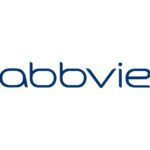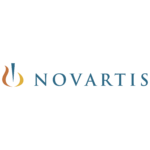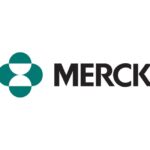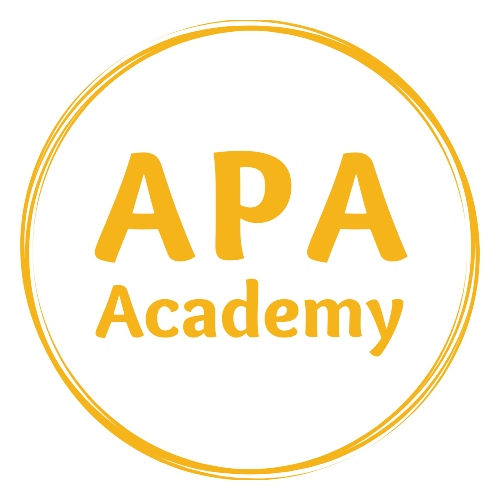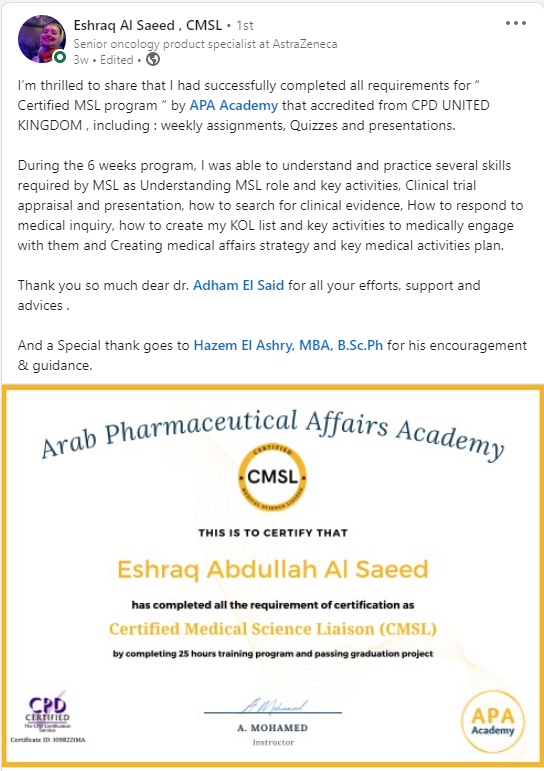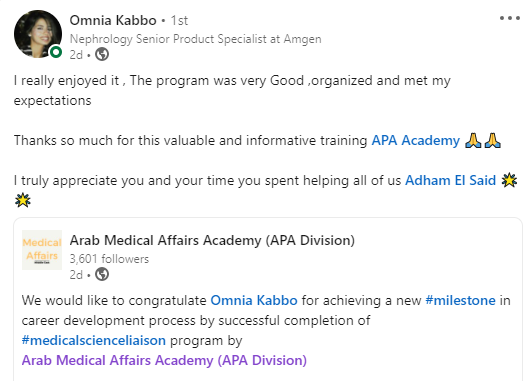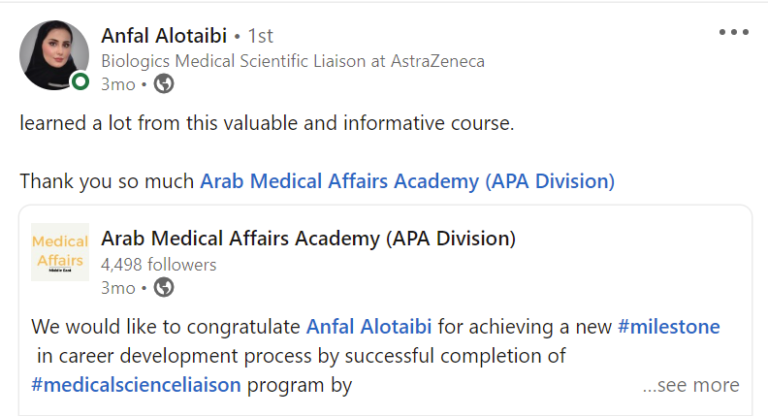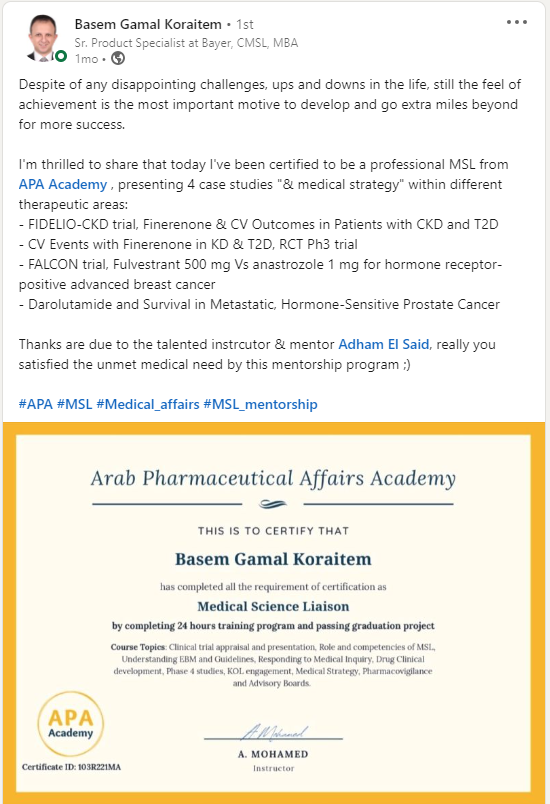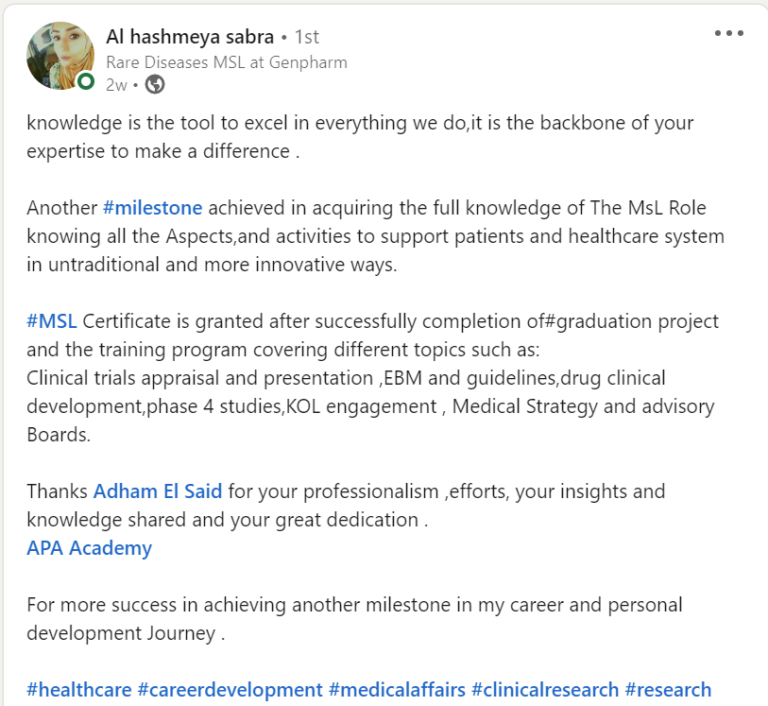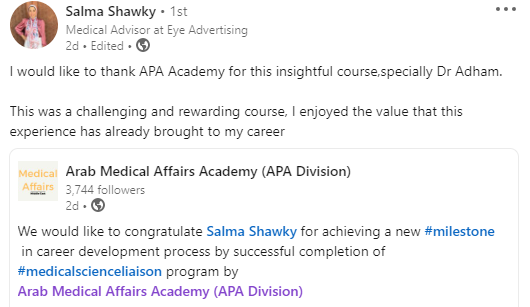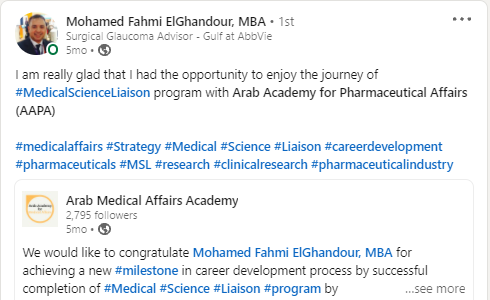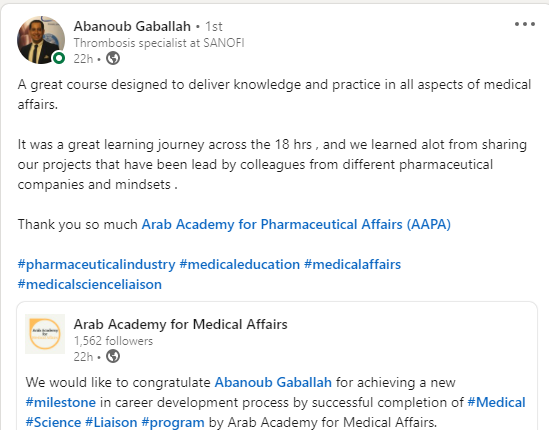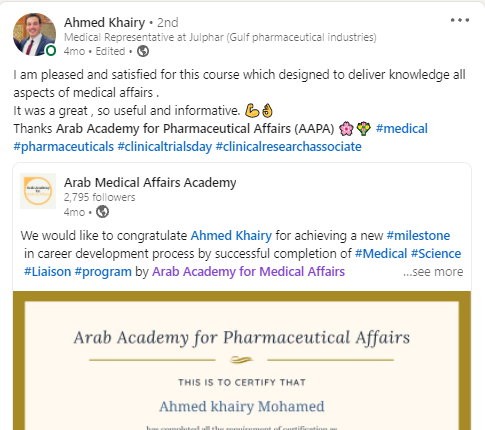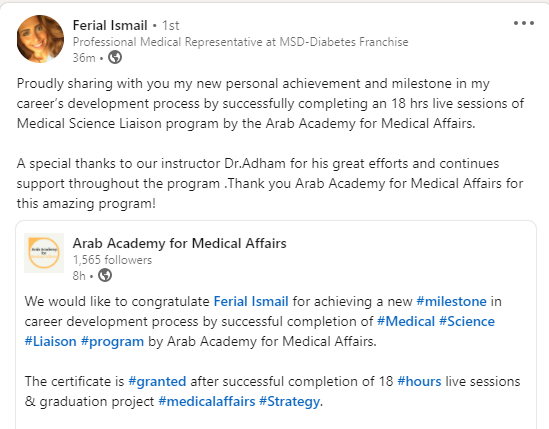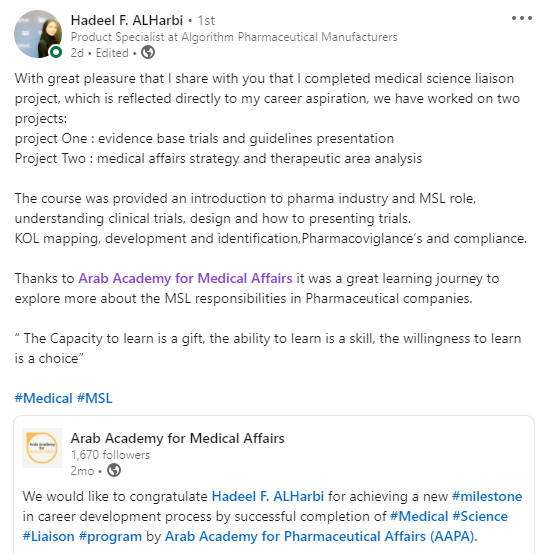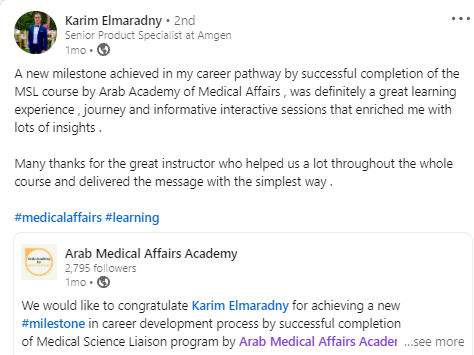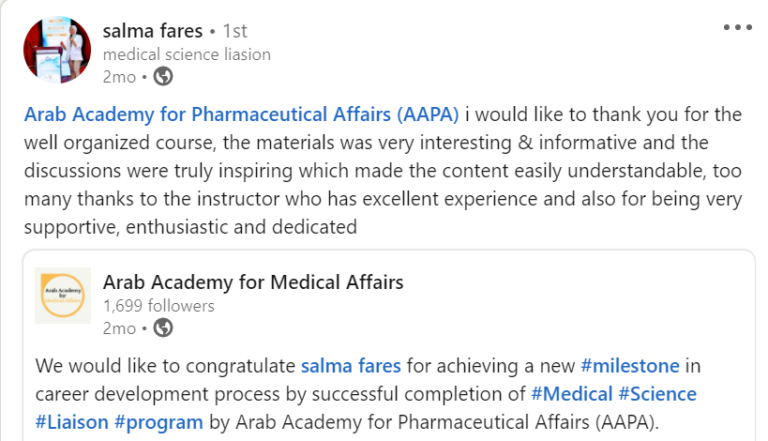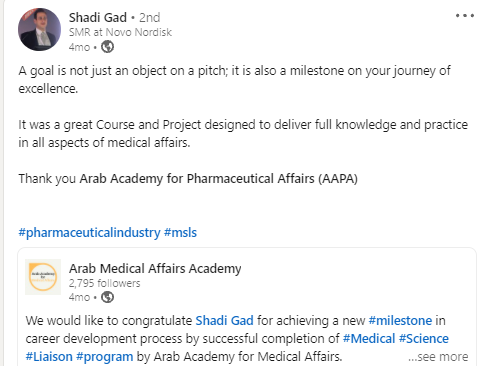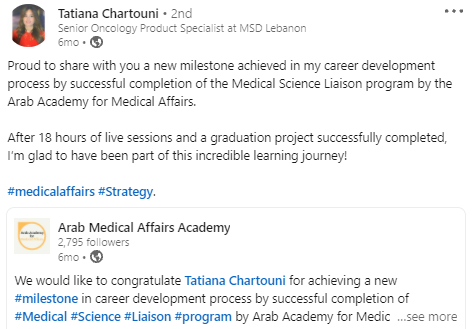Academy Of Pharmaceutical Affairs
Certified Medical Science Liaison
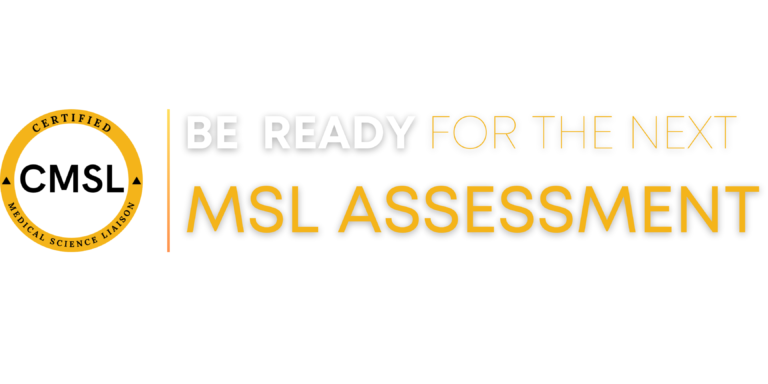
- Live Online Interactive Sessions (with records Availability)
- Free access to Mentorship Program (Monthly Development Sessions)
- Mock assessments on Clinical trial appraisal and Medical strategy.
- Free Support before MSL Assessment
- Re-attendance in future rounds
Cohort 22 - Online
Starting 16 August 2024
Not Just a Certificate, It is a learning journey.
Prepare yourself for MSL excellence
CMSL Learning Journey
10 Sessions - entirely Online with access to records. (4 hours/session)
Weekly Modules, with assignments, quizzes and final certification exam
Individual presentation with feedback on Medical strategy and Clinical trials appraisal
After Certification support
Individual coaching and mentorship after graduation, including MSL assessment support
Join our Medical Affairs Mentorship community with more than 350 Pharma industry professional
Program Instructor
Dr. Adham El Said
- Pharmacist.
- 13 years experience in the Pharmaceutical field.
- 8 years Experience in a Regional Medical Affairs role (MENA).
- Professional certified trainer from American University in Cairo.
- Qualified Professional trainer from ATD.
- Medical Affairs and soft skills trainer.
CMSL Learning outcomes
By the end of the program you will be able to:
- Understand the Role of a Medical Science Liaison (MSL) and the Required Competencies:
- Define the role of an MSL and explain its significance in the pharmaceutical industry.
- Identify the essential competencies and skills needed to be an effective MSL.
- Analyze the responsibilities and expectations of an MSL in different contexts.
- Answer Common Interview Questions:
- Recognize common interview questions typically asked in MSL job interviews.
- Apply effective strategies to answer interview questions confidently and convincingly.
- Evaluate and refine personal responses to common interview questions based on feedback and practice.
- Critically Appraise Clinical Trials:
- Analyze the components and design of clinical trials.
- Evaluate the quality and validity of clinical trial data.
- Synthesize and present a critical appraisal of a clinical trial.
- Create a Medical Strategy and Implement Different Medical Activities During the Product Life Cycle:
- Develop a comprehensive medical strategy for a pharmaceutical product.
- Plan and execute various medical activities aligned with the product life cycle.
- Justify the selection of specific medical activities based on the product’s stage and objectives.
- Create a Key Opinion Leader (KOL) List and Effectively Engage with Them:
- Identify criteria for selecting appropriate KOLs in a specific therapeutic area.
- Compile a KOL list based on the identified criteria and available resources.
- Develop strategies to engage and cultivate relationships with KOLs effectively.
- Understand Clinical Trial Terminologies:
- Define and explain key terminologies commonly used in clinical trials.
- Apply clinical trial terminologies to interpret and discuss trial protocols and results.
- Demonstrate proficiency in using clinical trial terminologies in written and oral communication.
- Professionally Present Each Section of a Clinical Trial:
- Demonstrate effective presentation skills in delivering each section of a clinical trial.
- Organize and structure information to ensure clarity and coherence in the presentation.
- Incorporate visual aids and supporting materials to enhance the understanding and engagement of the audience.
- Interpret Guidelines and Respond to Medical Inquiries:
- Interpret and analyze medical guidelines relevant to the pharmaceutical industry.
- Formulate accurate and comprehensive responses to medical inquiries based on guidelines and scientific evidence.
- Apply critical thinking skills to address complex medical inquiries effectively.
- Understand Different Types and Objectives of Post-Marketing Studies:
- Differentiate between various types of post-marketing studies.
- Identify the objectives and purposes of conducting post-marketing studies.
- Evaluate the relevance and value of post-marketing studies in different contexts.
- Manage Advisory Boards and Overcome Key Challenges:
- Demonstrate effective strategies for managing advisory boards in the pharmaceutical industry.
- Identify common challenges faced when working with advisory boards and propose solutions.
- Evaluate the outcomes and effectiveness of advisory board activities.
- Understand the Role of an MSL in Risk Management and Safety Education to Healthcare Professionals (HCPs):
- Explain the role of an MSL in risk management and safety education related to pharmaceutical products.
- Analyze the importance of safety education for healthcare professionals and its impact on patient outcomes.
- Develop strategies to effectively communicate risk management information to HCPs.
Online Live Program for ease of attendance.
- 10 online sessions (4 hours each)
- 1-1 graduation discussion session.
- Free Access to the Medical Affairs Mentorship program (Monthly development sessions).
- Free Support before MSL Assessment (1 to 1 coaching session).
- Access to Records for 1 year.
- Payment by Credit card or bank transfer.
Content
- Understanding Pharmaceutical Industry regulations.
- Role of MSL with different departments in pharmaceutical company.
- Why you need to be a Medical Science Liaison?
- What are the Medical Science liaison Job responsibilities?
- What are your competencies to be a Medical Science Liaison?
- Define the key components of clinical trials, such as study design, randomization, and blinding.
- Identify different phases of clinical trials and their purpose.
- Explain the ethical considerations and regulations involved in conducting clinical trials.
- Summarize the key elements of a clinical trial protocol, including inclusion and exclusion criteria, primary and secondary endpoints, and statistical analysis plan.
- Interpret and explain the results of clinical trials, including statistical significance, effect sizes, and confidence intervals.
- Compare and contrast different types of study designs used in clinical trials, such as randomized controlled trials, observational studies, and meta-analyses.
- Evaluate the validity and reliability of clinical trial results and their implications for clinical practice.
- Analyze the strengths and limitations of different types of clinical trials in addressing specific research questions.
- Identify potential sources of bias in clinical trials and propose strategies to minimize their impact.
- Design a comprehensive presentation to effectively communicate the key findings and implications of a clinical trial to healthcare professionals or other stakeholders.
- Slide Structure.
- Main items to include in clinical trial presentation.
- How to add references your presentation.
- Different Reference styles.
- How to search for clinical evidence. (PICO Search)
- How read clinical guidelines grading system.
- How to respond to medical inquiry.
- How to Respond to Off-label use inquiry.
- Creating Standard response document.
- Types of postmarking research.
- Different Objectives of Phase 4 studies and IIS.
- Role of Medical affairs in Phase 4 research & ISS.
- Role of Phase 4 studies in post launch activities.
- Principals of Good clinical practice.
- How to identify your KOL according to disease area?
- How to create a KOL Map?
- How to engage KOL in medical activities?
- How to develop speakers for your product?
- What is insights? How to get them?
- Guidance for Proactive and Reactive interaction with KOL.
- How to prepare medical affairs strategy.
- How to make therapeutic area analysis?
- Types of Medical affairs activities during Pre-launch phase.
- Objectives of Medical affairs activities.
- Medical affairs activities during product life cycle.
- Medical Affairs Dashboard.
- Different types of Advisory boards.
- How to select Advisory board attendees.
- How to prepare for advisory board.
- How to report advisory board.
- Pharmacovigilance basics.
- Role of Medical affairs in supporting drug safety.
- Risk management plans.
- DHCPL and Adverse event reporting.
Our Graduates from more than 50 company across MENA Region

